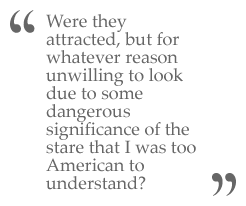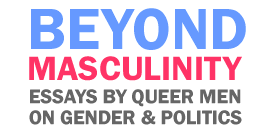|

hile
studying abroad in Paris last fall, I finally learned
the value of eye contact. In that city of millions of
people and grand boulevards, appearing in public is all
about being seen. Caught up in the day-to-day “métro,
boulot, dodo,” one has so many opportunities to go on
exhibit, or steal a fleeting glimpse. The advertisements
on billboards and trains only seem to encourage this
voyeurism through the attractive bodies constantly on
display. People-watching is a sort of municipal pastime.
This could have been all well and good for me, had I not
felt absolutely invisible. Even with millions of
Parisians around me, practically no one, I thought,
looked at me. Aside from a few matched stares in the
predominantly gay Marais neighborhood, there were no
mutual glimpses that I could interpret as human, let
alone sexual, interest.
 Part of the problem might have been that if anyone was
looking, it was women—and I never noticed because I was
not looking at them. It’s not likely, and since I am not
prone to self-flattery, I’ll stick with my initial
observation. Were Parisian men just not attracted to me?
Were they attracted, but for whatever reason unwilling
to look due to some dangerous significance of the stare
that I was too American to understand? Was I just not
looking in the right places? And why, for the love of
Edith Piaf, did I care so much? I mean, I had a
boyfriend back in the states and I had both American and
Parisian friends in France. Yet, the anonymity which I
felt on Paris’s boulevards became not liberating, but
painful, somehow, since I was never acknowledged by the
gaze of another. Part of the problem might have been that if anyone was
looking, it was women—and I never noticed because I was
not looking at them. It’s not likely, and since I am not
prone to self-flattery, I’ll stick with my initial
observation. Were Parisian men just not attracted to me?
Were they attracted, but for whatever reason unwilling
to look due to some dangerous significance of the stare
that I was too American to understand? Was I just not
looking in the right places? And why, for the love of
Edith Piaf, did I care so much? I mean, I had a
boyfriend back in the states and I had both American and
Parisian friends in France. Yet, the anonymity which I
felt on Paris’s boulevards became not liberating, but
painful, somehow, since I was never acknowledged by the
gaze of another.
I marveled at the way the female American students that
had come with me to Paris garnered no shortage of
attention, and I wondered whether mine was a problem
particular to gay men. Was it only women that got
noticed in the public? Men, the common story goes, are
the lookers. It is, after all, Peeping Tom and not
Peeping Jane. Men are supposed to whistle and cat-call
in public, while women walk demurely by. Women are the
spectacle to be seen, while men are ones with the roving
eyes. It is how the vast majority of little boys are
socialized, and one of the ways that girls and boys are
raised differently.
But when I asked those same American girls how they felt
about men’s eyes on them in the streets, they expressed
discomfort. “It’s like we’re objects,” some would say.
Aha, I thought. That’s a familiar concept for
me—objectification through sight. It’s a theoretical
concept that writers of modern cultural theory (and
their feminist groupies) call the gaze, that
particular ability of the eye to explore, know, and
consume. They write that who wields the gaze and who is
subject to it can tell us a lot about privilege, power,
and objectification.
Or… can it? There are so many cracks in the theory: Is
the gazer always in power? What about blind people? And
the queer gaze? In the end, the complexities of lived
experience, of gawking and exhibiting, sometimes feel
“un-theorizable.” In order to make sense of my feelings
of invisbility and anonymity in France and, to some
extent, throughout my life, I’d have to think not just
who wields the gaze, but who wants the gaze, who
wants to gaze, and how race and gender affect
this desire to see and be seen.
What the Foucault?
Paris proved to be an oddly appropriate setting for my
thinking about these issues since, for one reason or
another, many of the influential social theories about
the gaze first saw the light of day in France. In no way
can I do justice to the entire Pantheon of French
philosophy on this issue, but I’d like to revisit some
of the notable theories if only to show that none of
them have ever hit the bull’s eye for me.
The famed French Freudian psychologist Jacques Lacan
watched infants looking at mirrors and thought that
there was a profit to be turned in writing about it. So
he defined le regard—the gaze—as an awareness
that what is looking back in the mirror at us is
ourselves. Sort of a tough concept to swallow if you’re
still teething. But later on, he thought, the gaze
develops into this sense that what we are looking at is
looking back at us with an uncanny consciousness,
whether it’s our reflection in the mirror or a pigeon in
the park. For all his perhaps underwhelming insight, he
was among the first to write about the power and mystery
that pure staring could encompass.
It took a little while longer for Michel Foucault, that
theory queer par excellence and alleged lover of
bondage, to write about the cruel power of the gaze.
Inspired by the Victorian era prisons, hospitals, and
other places of “treatment,” he described a cold,
all-knowing “clinical gaze” that modern doctors use in
his groundbreaking book The Birth of the Clinic.
He writes that it is a kind of stare that confers all
the power upon the doctor to know his subject and to
cure that subject. So in other words, whoever wields the
gaze has the ability to control and dominate the one
being looked at. And this is almost certainly true of
Victorian prisons at least, but I’ve always felt that
this is a poor mirror for day-to-day life among
strangers. It’s worthwhile remembering how the stare
can be frighteningly oppressive, but also important
not to take this idea too far... (continue reading)
|




7 COMMENTS ON THIS ESSAY:
Thank you for writing about my blog and for linking to it.
That was a very thought-provoking article and parts of it definitely rang true for me as a gay man taking feminist classes. Thank you.
excellent article that rings true for me in so many ways. thanks for writing it.
I've read about 70% of the essays here, and this is my favourite due to its academic & philosophical basis.
Meaningful and precise reading about gaze and objectification is hard to find. Texts on gaze/objectification (=G/O) may be interesting but are often inspirational discourses without scientific foundation. Comforting warm air with good intention.
What we need is personal and societal development towards personal and mutual insight, accept, trust, sharing, UNDERSTANDING, knowledge, wisdom and compassion. (Yes, there is buddhist inspiration here.)
The fortune of UNDERSTANDING:
The simple truth "It's all in the mind" makes good foundation for a progressive awareness of a G/O process. We need have both the freedom and responsibility to remember that our impressions, perceptions, thoughts, (re)actions are ultimately our own choices.
Most will easily agree that (re)actions should better reflect informed choices rather than be rushed or instinctual. Few however trust that also impression, perception and thought are actually "chosen" options. If however you accept the fact that "society" somewhat conditions your impression, perception and thought, you're already halfway towards realizing that they ultimately rest on personal choices - however petrified the current pattern of impression, perception and thought appears to be - in a person or within a group.
Keep this in mind always and everywhere. Read this once again perhaps. All in the mind and all own choice.
Use this essence as guide to walking the fine line BETWEEN mindfully experiencing visual impression - AND - experiencing the thoughts and emotions appearing after. Perfection here includes seeing your rising desire. Then come thoughts and mental reflections. The sequences of your mind. You may feel insecurity? Fear of upsetting the object perhaps? Rejection? Stop for a moment!
Remember it's all in the mind. Our minds may stick looping endlessly in the warm air of mental imaginery - or just plain ignorance. Stupidity actually. Invalidated by habit and influenced by others without clear insight we need to look at the root. Our choice.
Choose between seeing and labeling. Between experience and expression. Between sharing and demanding. Between feeling and craving. Between loving and being loved.
Mr. Dorm Hunk is your label. It's your eyes that facilitate your visual impression. Your mind experiences your pleasure, desire, insecurity, fear and so on. Please cleverly separate and understand these ingredients and assume full responsibility for applying your awareness.
The visual impression may induce pleasure. You may stop and just enjoy. Or you may not feel satisfied. You want more. A second glance. You are aware of your desire. You chose to look again. It's fear that keeps you from doing this openly. Your fear. Or perhaps consideration for the object. You imagine Mr. Hunk Dorm may suffer if noticing your signs of joy. Or become upset. All in your mind. Your informed choice remains: decide what you want and possibly act.
In this life we are endowed with senses. Some even with a bit of wisdom. Very important knowledge about good and bad. How to avoid causing suffering. How to promote peace and happiness. Few acquire peace and happiness once and for all. Most however want to contribute. Thats compassion.
Our divine human potentials are best served through recognition, trust and respect. Not through blockages, stiff conventions or by veils. Recognize, trust and respect an attraction. Feel the feeling. Let it be. Rest there. Take time. Grasping for rewards or a reaction from Mr. Hunk Dorm is compassionately better avoided. Actively offering him your loving admiration is preferable. You need to train in expanding trust and confidence. Trust that both you and Mr Dorm Hunk have wish, capacity, and responsibility to mindfully cooperate in the respectful sharing of experiences.
Trust that ultimately it's all about love. Your divine potential. His too.
Contribute with your expressions of love and appreciation - avoiding attachment or grasping for more.
Will there be disappointments? Yes.
Because you have attachment to pleasure. Not to insecurity, fear, rejection and suffering.
Something meaningful will fall into your basket. Maybe Mr. Dorm Hunk will get his experience of joy too.
While there is diversity within the GLBT community, there is also camraderie based on the similarities. I do find that there is a gaze, a technique of staring, which many gay men, at least, use to identify each other. For me, it is an almost primal signifier of somebody of the same "tribe", as it were. A sort of shibboleth.
excellent. Not only intellectually stimulating but also a very thoughtful and generous piece. Rings true for so many, myself included.